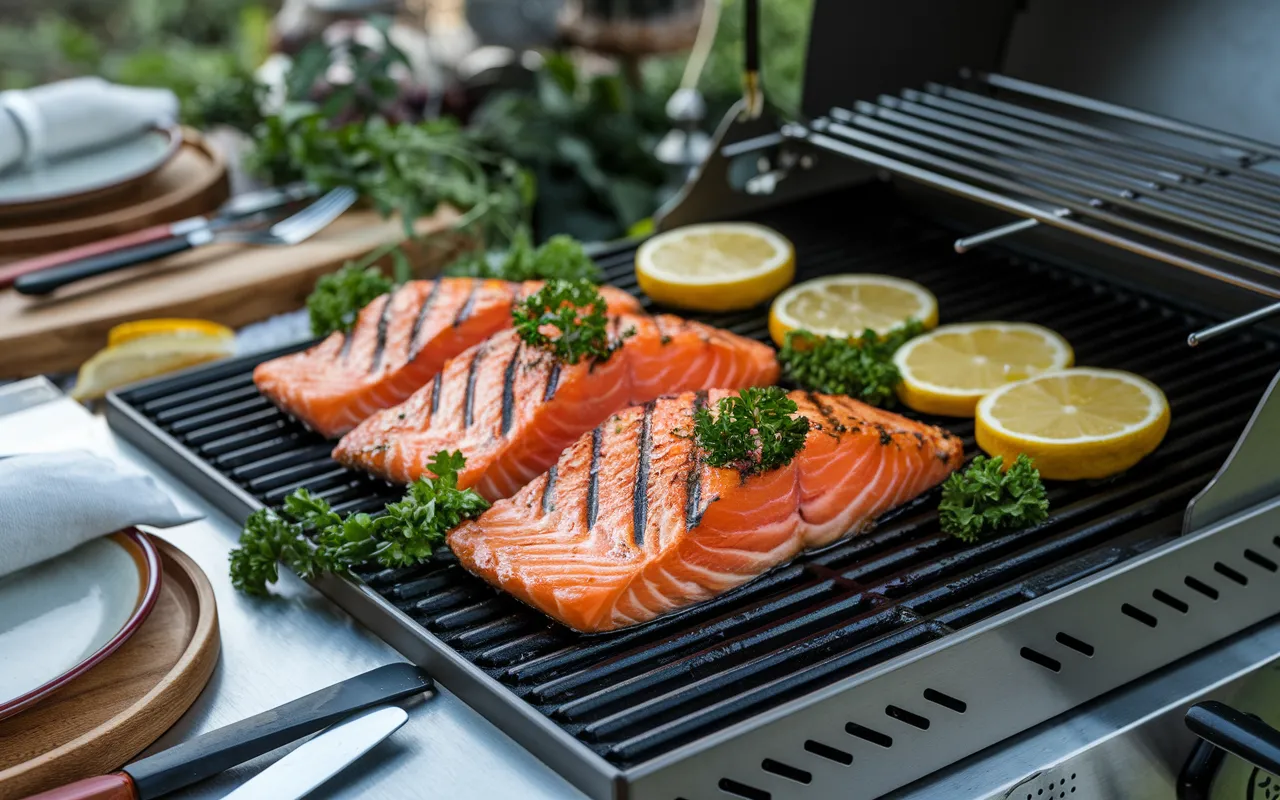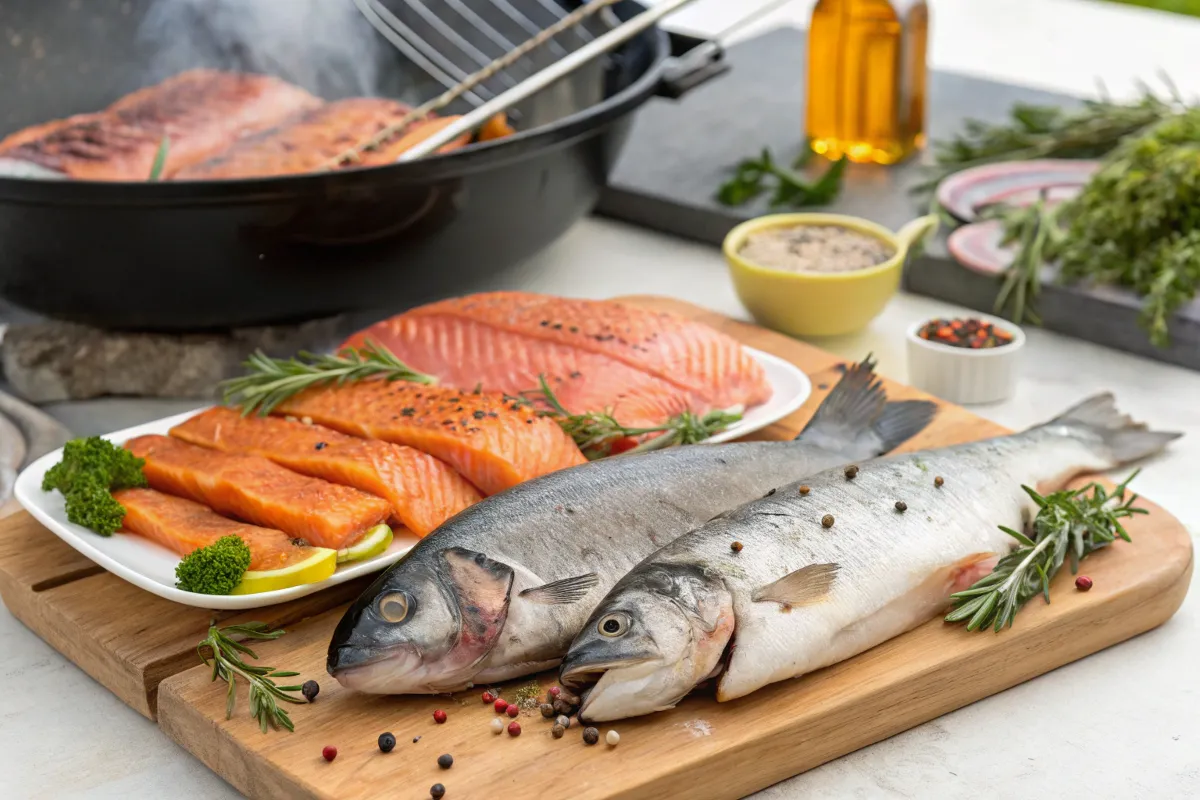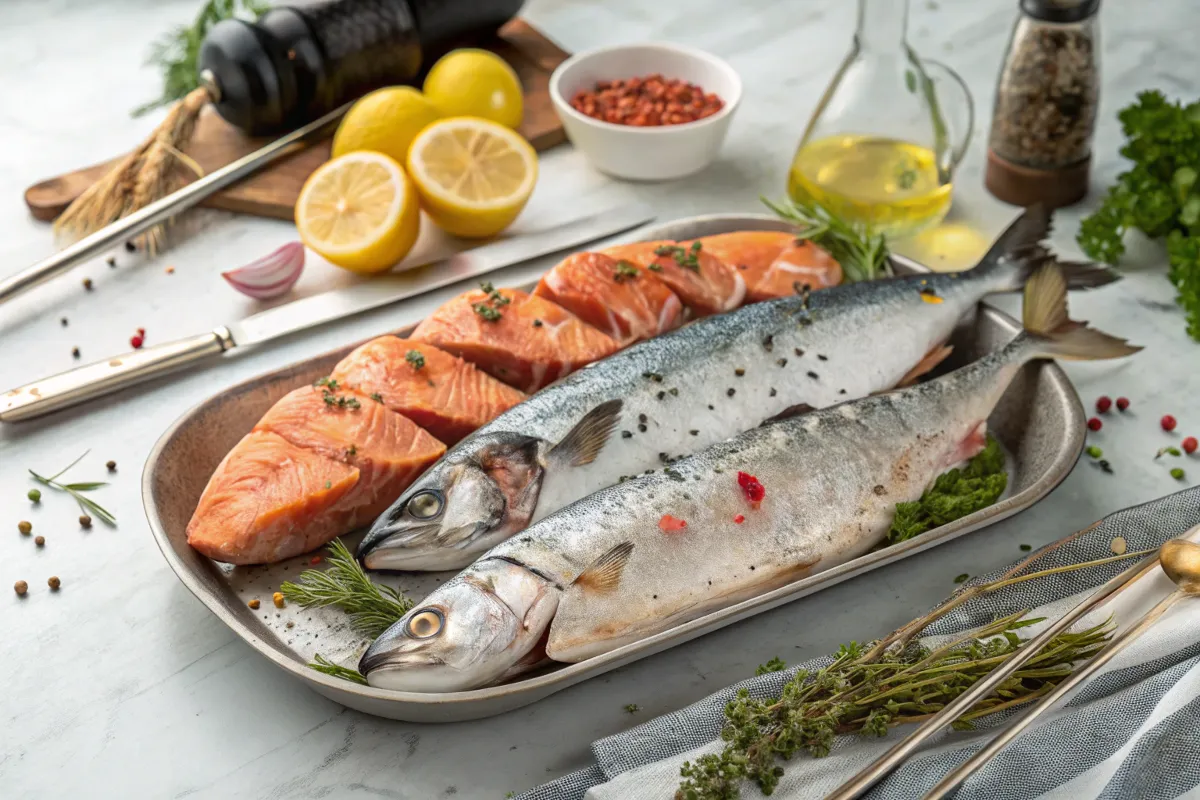Grilling fish is an art that combines the delicate flavors of seafood with the smoky richness of the grill. The key to success lies in choosing the best fish for grilling, knowing how to prepare it, and understanding different grilling techniques. In this article, we’ll explore the top fish choices for grilling, preparation tips, common mistakes to avoid, and more. Whether you’re a seasoned griller or a beginner, this guide is your ticket to mastering the art of grilled fish.
Importance of Choosing the Right Fish for Grilling
Why Does Choosing the Right Fish Matter?
The first step to perfectly grilled fish is selecting the right kind. Not all fish are created equal when it comes to grilling. Some are too delicate and prone to falling apart, while others shine on the grill with their firm texture and robust flavors. Picking the wrong fish can result in frustration and wasted effort.
Grilled fish is all about balance—the texture should hold up to the grill’s heat, while the flavors should complement the smoky char. Think of it like pairing the perfect dance partners; a mismatch can lead to a less-than-stellar performance.
Qualities of the Best Fish for Grilling
When selecting fish for grilling, consider these essential qualities:
- Firmness and Texture: Fish with firm flesh, like salmon and tuna, stay intact on the grill and develop lovely grill marks.
- Flavor Profile: Look for varieties with a mild to medium flavor that complements marinades and spices, such as snapper or mahi-mahi.
- Oil Content: Fish like mackerel and trout are naturally oily, making them flavorful and resistant to drying out during grilling.
- Fillet Thickness: Thicker fillets hold up better on the grill, reducing the chances of overcooking.
Environmental Considerations
When choosing your fish, sustainability matters. Overfishing and unethical practices can harm marine ecosystems. Opt for fish certified by organizations like Seafood Watch to ensure your choices are environmentally friendly.
Cultural Significance of Grilled Fish
In many cultures, grilling fish is more than just a cooking method—it’s a way of life. From backyard barbecues to coastal feasts, grilled fish holds a special place in culinary traditions worldwide. The ability to choose the ideal fish for grilling can transform your meal into a memorable event.
Factors to Consider When Selecting Fish for Grilling
Firmness and Texture
The firmness and texture of fish are crucial for grilling success. Firm fish is less likely to flake or fall apart when exposed to high heat. Varieties such as salmon, swordfish, and tuna maintain their integrity, even when turned multiple times on the grill.
Delicate fish like tilapia or sole, while delicious, are not the best candidates for grilling directly. Instead, they benefit from techniques like foil packets or grilling baskets. Firm fish not only hold their shape but also develop appealing grill marks that elevate the dish’s presentation.
For home cooks, this characteristic is a game-changer. The ability to handle your fish confidently ensures a stress-free grilling experience, making grilling seafood accessible for everyone.
Flavor Profile
A fish’s flavor profile determines how well it pairs with grilling techniques. Mild-flavored fish like halibut or snapper are versatile, complementing a wide range of marinades, rubs, and sauces. On the other hand, richly flavored fish like mackerel or salmon stand on their own, needing minimal seasoning to shine.
When choosing fish, think about how smoky flavors from the grill interact with its natural taste. For instance, tuna’s meaty flavor pairs excellently with bold marinades, while mahi-mahi is perfect with tropical-inspired seasonings. Knowing the flavor profile helps create a harmonious dish that delights the palate.
Oil Content
Oil content is another vital factor when selecting fish for grilling. Fish like mackerel, trout, and salmon are rich in natural oils, which act as a safeguard against dryness. These oils also contribute to the fish’s tenderness and enhance its flavor when cooked over high heat.
Oily fish tend to sear beautifully, forming a delicious crust while remaining juicy inside. Additionally, they require less added fat, making them a healthier choice for grilling enthusiasts. Low-oil-content fish, like snapper or halibut, can still be grilled but may need a marinade or basting to maintain moisture.
Thickness of the Fillet
The thickness of the fillet is a practical consideration that can make or break your grilling experience. Thicker fillets—about 1 to 1.5 inches—grill more evenly, giving you enough time to develop a crisp exterior without overcooking the inside.
Thin fillets are prone to drying out, which can be frustrating for cooks aiming for perfection. If you’re working with thinner fish, indirect grilling or wrapping them in foil can help retain moisture. Choosing the right thickness ensures a consistent cooking process and a delightful texture in every bite.
Top Fish Choices for Grilling
Salmon
Salmon is the undisputed champion of grilled fish. Its firm texture, rich oil content, and bold flavor make it ideal for grilling. It handles high heat beautifully, creating a slightly crispy crust while staying tender inside.
Salmon’s versatility is unmatched; it works with everything from a simple sprinkle of salt and pepper to complex spice blends. Whether grilled as fillets, steaks, or even kebabs, salmon never disappoints.
Swordfish
For those who prefer meatier fish, swordfish is an excellent choice. Its dense, steak-like texture holds up well on the grill and pairs perfectly with citrus marinades or herb-based rubs.
Swordfish’s mild flavor is a blank canvas, allowing you to experiment with bold seasonings without overwhelming the dish. Grilled swordfish steaks are a favorite for outdoor cookouts due to their hearty feel and satisfying bite.
Tuna
Tuna’s meaty flavor and firm texture make it another top contender for grilling. Often cooked rare to medium-rare, tuna develops a delightful char on the outside while maintaining a tender, almost steak-like quality inside.
Popular in cuisines like Hawaiian and Japanese, tuna pairs beautifully with soy-based marinades or sesame seeds. Its adaptability makes it a favorite among adventurous cooks looking to impress.
Mahi-Mahi
Mahi-mahi, also known as dolphinfish, is a tropical delight perfect for grilling. Its mild, slightly sweet flavor pairs well with tangy marinades like citrus or pineapple.
The firm texture ensures it won’t fall apart on the grill, making it a reliable option for beginners. Whether served as tacos or paired with grilled vegetables, mahi-mahi brings a burst of flavor to any summer meal.
Snapper
Snapper is a crowd-pleaser thanks to its mild, slightly nutty flavor and firm texture. Grilled whole or as fillets, snapper benefits from minimal seasoning, allowing its natural taste to shine.
To elevate its flavor, try grilling snapper with a squeeze of lemon and a sprinkle of fresh herbs. Its versatility and ease of preparation make it a favorite among home cooks and chefs alike.
Halibut
Known for its delicate flavor and flaky texture, halibut might seem like a challenging option for grilling. However, its firm flesh ensures it grills beautifully when handled with care.
Halibut pairs wonderfully with light marinades and herb butter. Grilled halibut is a healthy and elegant dish that impresses with its simplicity.
Trout
Trout, especially rainbow trout, is a fantastic choice for grilling due to its naturally oily texture and mild flavor. Whole-grilled trout stuffed with fresh herbs and lemon is a showstopper dish that’s as flavorful as it is visually appealing.
The smoky flavors from the grill enhance trout’s subtle sweetness, making it a standout choice for any barbecue.
Mackerel
Mackerel’s bold flavor and high oil content make it a standout on the grill. Its strong taste pairs well with acidic or spicy marinades that cut through its richness.
Grilled mackerel is not only delicious but also an excellent source of omega-3 fatty acids, making it a nutritious option for seafood lovers.
Grouper
Grouper is prized for its mild, slightly sweet flavor and dense texture, which makes it perfect for grilling. It works well with simple seasonings or bold marinades, adapting effortlessly to various flavor profiles.
When grilled, grouper develops a firm yet flaky texture that pairs wonderfully with fresh vegetables or light salads.
Catfish
Catfish is a popular choice for those seeking a Southern-style grilled fish. Its mild flavor and dense texture hold up well on the grill, making it easy to cook and serve.
Grilled catfish benefits from spice rubs or marinades with a touch of heat, creating a dish that’s both comforting and flavorful. It’s an excellent option for family gatherings or casual barbecues.
Preparation Techniques for Grilling Fish
Marinating
Marinating fish is a game-changer when it comes to grilling. A good marinade not only enhances the flavor but also tenderizes the fish and adds moisture, ensuring it doesn’t dry out during grilling.
Choose marinades that balance acidity, oil, and seasoning. For example, a mix of olive oil, lemon juice, garlic, and herbs complements mild fish like snapper and halibut. Richer fish like salmon pair well with soy-based or honey-glazed marinades.
However, don’t overdo it—marinating for 20-30 minutes is usually enough. Longer times, especially for acidic marinades, can break down the fish too much, leaving it mushy. Keep the fish refrigerated during this process to maintain its freshness.
Seasoning
Seasoning is the cornerstone of great grilled fish. Whether you’re keeping it simple with salt and pepper or getting creative with spice rubs, seasoning enhances the natural flavors of the fish.
For mild-flavored fish like mahi-mahi or trout, a sprinkle of paprika, garlic powder, and a dash of lemon zest works wonders. For bolder varieties like tuna or swordfish, try chili powder or Cajun spice blends.
Always season generously but evenly, ensuring the flavors penetrate the fish. Applying seasoning right before grilling prevents moisture loss, helping the fish remain juicy.
Using Skewers and Grill Baskets
If you’re grilling delicate fish like catfish or smaller fillets, skewers and grill baskets are your best friends. Skewers, especially bamboo or stainless steel, make flipping fish easier while ensuring even cooking.
Thread bite-sized pieces of fish onto skewers, alternating with vegetables like bell peppers or zucchini for a colorful, flavorful presentation. For whole fish or fillets, grill baskets offer excellent support, preventing sticking and crumbling.
Before use, always oil the grill basket or skewers to ensure the fish releases cleanly after cooking. These tools are especially helpful for beginners looking to master grilling fish without mishaps.
Maintaining Optimal Grill Temperature
The right temperature is essential for grilling fish to perfection. Preheat your grill to medium-high heat, approximately 375-400°F, which is ideal for most types of fish.
Too low, and your fish won’t achieve that beautiful char; too high, and it risks burning or sticking to the grill. Using a thermometer or testing with your hand (hovering above the grill) can help gauge the right heat.
Keep the lid closed as much as possible to maintain even heat and speed up cooking. This practice ensures the fish cooks through without drying out, creating a flawless texture every time.
Grilling Methods for Different Types of Fish
Direct Grilling
Direct grilling is a straightforward method perfect for sturdy fish like tuna, swordfish, or salmon. The fish is placed directly over the flames, allowing for quick cooking and the formation of tantalizing grill marks.
For this method, oil the grill grates thoroughly to prevent sticking. Flip the fish only once to maintain its structure, and use a wide spatula for support. The cooking time typically ranges from 3-5 minutes per side, depending on the fillet’s thickness.
Indirect Grilling
Indirect grilling involves cooking the fish away from direct heat, using the grill as an oven. This method is ideal for whole fish or thicker cuts like halibut and grouper.
To set up indirect heat, light one side of the grill and place the fish on the unlit side. This technique allows the fish to cook evenly without charring the exterior too quickly. It’s particularly useful when you need a slower, more controlled cooking process.
Using Foil Packets
Foil packets are a lifesaver for grilling delicate fish like sole or trout. Wrapping the fish in foil not only locks in moisture but also keeps flavors concentrated.
To prepare, lay the fish on a sheet of aluminum foil, add your choice of seasonings, vegetables, and a splash of liquid (like lemon juice or broth), then seal the edges tightly. Place the packet on the grill and let it cook for 10-15 minutes, depending on the thickness. This method eliminates the worry of sticking and overcooking.
Plank Grilling
Plank grilling is a unique method that imparts a subtle smoky flavor to the fish. Cedar planks are the most popular choice, but maple or hickory works too.
Soak the plank in water for at least an hour to prevent burning, then place the fish directly on the plank and onto the grill. This method works exceptionally well for oily fish like salmon and mackerel, creating a beautifully moist and flavorful result.
Plank grilling is a surefire way to impress guests with a restaurant-quality dish that’s as visually stunning as it is delicious.
Health Benefits of Grilled Fish
Nutritional Value
Grilled fish is a powerhouse of nutrients that contributes to a balanced diet. Rich in essential vitamins like B12 and D, it supports brain health and bone strength. Fish also contains selenium, a mineral known for its antioxidant properties that combat free radicals in the body.
Compared to other protein sources, fish has a unique profile. For example, grilling preserves much of the nutrients that might otherwise be lost in frying or baking. Including grilled fish in your diet ensures you reap its maximum nutritional benefits without added fats or oils.
Omega-3 Fatty Acids
One of the standout features of fish is its high omega-3 fatty acid content. These healthy fats are crucial for heart health, reducing inflammation, and improving brain function. Fish like mackerel, salmon, and trout are particularly rich in omega-3s, making them excellent choices for grilling Healthline
Regular consumption of omega-3s has been linked to lower risks of cardiovascular disease, improved mental health, and even better sleep quality. Grilled fish retains these beneficial fats, offering a delicious and health-conscious way to include them in your meals. Learn more about omega-3 benefits from
Low-Calorie Protein Source
For those watching their calorie intake, grilled fish is a lean protein option that doesn’t compromise on flavor or satiety. With fewer calories per gram compared to red meat, fish like snapper, catfish, and grouper provide the energy you need without unnecessary fats.
Additionally, the grilling process enhances the fish’s natural flavors without requiring high-calorie marinades or sauces. This makes grilled fish an excellent choice for weight management and maintaining a healthy lifestyle. Whether paired with fresh vegetables or whole grains, it’s a meal that nourishes without weighing you down.
Common Mistakes to Avoid When Grilling Fish
Overcooking
Overcooking is the most common mistake when grilling fish, and it can turn a delicious meal into a dry, flavorless disappointment. Fish cooks quickly, often in just a few minutes per side. Exceeding the optimal time causes the proteins to tighten excessively, resulting in a tough texture.
The best way to avoid overcooking is to monitor the fish closely and use an instant-read thermometer. Most fish is done when it reaches an internal temperature of 145°F and flakes easily with a fork. Removing the fish slightly before it’s fully cooked allows residual heat to finish the job, preserving moisture and flavor.
Not Preheating the Grill
Failing to preheat the grill is another pitfall that can ruin your fish. A cold grill leads to sticking, uneven cooking, and difficulty in achieving those coveted grill marks. Preheating ensures the grates are hot enough to sear the fish instantly, locking in juices.
Always heat the grill to medium-high (375-400°F) before placing the fish. Additionally, oil the grates thoroughly to create a nonstick surface. This small step makes a world of difference, giving you a smooth cooking process and a professional-looking result.
Improper Seasoning
Seasoning fish requires balance—too little, and the dish can taste bland; too much, and it can overwhelm the natural flavors. Many cooks skip the crucial step of patting the fish dry before seasoning, which helps spices adhere and enhances flavor penetration.
For mild fish like halibut or mahi-mahi, use light, complementary seasonings such as herbs or citrus zest. For robust fish like mackerel or tuna, bolder spice blends work best. Proper seasoning elevates the dish without overshadowing the smoky essence imparted by the grill.
Frequently Asked Questions
What is the best fish to grill for beginners?
For beginners, firm fish like salmon or swordfish are ideal. They are easy to handle, cook evenly, and deliver great flavor without requiring complex techniques.
How can I prevent fish from sticking to the grill?
Preheating the grill and oiling the grates are essential steps. Pat the fish dry and brush it lightly with oil to ensure it releases easily after cooking.
Is it better to grill fish with the skin on or off?
Grilling fish with the skin on helps retain moisture and adds flavor. The skin also acts as a barrier, preventing the fish from sticking to the grill.
How do I know when grilled fish is done?
Grilled fish is done when it reaches an internal temperature of 145°F and flakes easily with a fork. A slightly translucent center is fine as residual heat will finish the cooking.
Can I grill frozen fish?
Yes, but it’s better to thaw fish before grilling for even cooking. If grilling frozen, use indirect heat and extend the cooking time slightly to avoid overcooking the exterior.
What are some vegetarian alternatives to grilled fish?
Vegetarian options like grilled portobello mushrooms, eggplant, or tofu can mimic the texture and smoky flavor of grilled fish. Marinade them with similar spices for a comparable taste.




